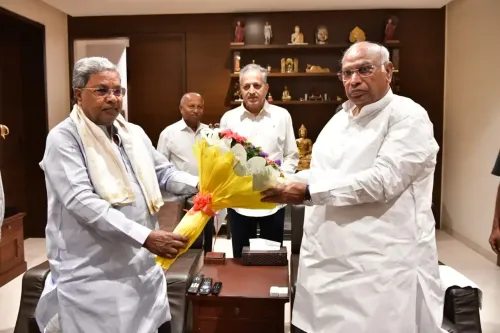Did Amit Malviya Counter Jairam Ramesh's US-Pakistan Missile Contract Claim?

Synopsis
Key Takeaways
- Amit Malviya counters claims of diplomatic failure regarding US-Pakistan ties.
- The missile contracts are routine maintenance, not new strategic shifts.
- India's global standing allows for strong diplomatic engagement.
- Congress's narrative could reflect past governance failures.
- Shifting diplomatic relations warrant ongoing public discourse.
New Delhi, Oct 8 (NationPress) BJP leader Amit Malviya on Wednesday responded strongly to Congress senior leader Jairam Ramesh, who described a recent US military contract with Pakistan as a “diplomatic setback” for India, labeling the statement as a deliberate distortion of facts.
In a pointed reply on X, Malviya, who leads the BJP’s IT Cell, stated, “Not quite the ‘diplomatic setback’ some are trying to project. The recent US contract notification isn’t about any new strategic shift — it’s part of a replacement and maintenance cycle for supplies first made in 2006. Such contracts are routine, often involving both allied and non-allied nations with strict end-use monitoring.”
He further charged the Congress with either “ignorance or deliberate distortion,” asserting that India's current global standing enables it to engage from a “position of strength, not submission.”
Malviya added, “To label this a diplomatic failure indicates either ignorance or deliberate distortion. If Congress perceives this as a ‘setback,’ perhaps it’s acknowledging its own failure to manage global partnerships during its tenure.”
His comments followed Ramesh's earlier post, which detailed two public notifications by the US Department of War regarding military contracts.
According to Ramesh, a notification dated May 7, 2025, listed countries such as Canada, Taiwan, Bulgaria, Hungary, Poland, Sweden, Czech Republic, South Korea, Kuwait, Japan, Finland, Germany, UK, Italy, Netherlands, Norway, Belgium, Australia, Turkey, Spain, and Lithuania as recipients of Raytheon-made advanced medium-range air-to-air missiles (AMRAAMs).
He pointed out that a subsequent notification issued on September 30, 2025, also included Qatar, Oman, Saudi Arabia, Israel, Turkey, and Pakistan among the countries to receive similar supplies.
“How swiftly the diplomatic climate shifts, and how rapidly diplomatic setbacks accumulate!” Ramesh commented in his post, which elicited a strong rebuttal from the BJP leader.









